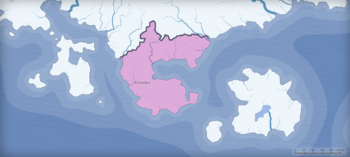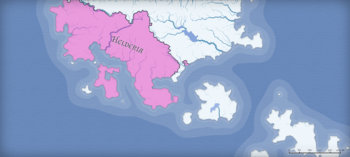Helderia
This article is incomplete because it is pending further input from participants, or it is a work-in-progress by one author. Please comment on this article's talk page to share your input, comments and questions. Note: To contribute to this article, you may need to seek help from the author(s) of this page. |
Kingdom of the Helds Kreispereik Heelspreiken (Old Heldervinian) | |||||||||||||||
|---|---|---|---|---|---|---|---|---|---|---|---|---|---|---|---|
| 734–1275 | |||||||||||||||
 Helderia at its founding in 734 | |||||||||||||||
 The empire during the reign of Chaburteen II, at its greatest extent | |||||||||||||||
| Capital | Various | ||||||||||||||
| Official languages | Old Heldervinian | ||||||||||||||
| Religion | Originally Held paganism, later Saletrism | ||||||||||||||
| Demonym(s) | Heldic | ||||||||||||||
| Government | Monarchy | ||||||||||||||
| Historical era | Early and High Middle Ages | ||||||||||||||
| 720 | |||||||||||||||
• Death of Chaburteen II | 1255 | ||||||||||||||
| |||||||||||||||
| Today part of | Heldervin | ||||||||||||||
The Kingdom of the Helds (Old Heldervinian: Kreispereik Heelspreiken), also known as Helderia, was a medieval kingdom in the post-Ledonian Trihhimerein Peninsula. Helderia was among the last remnants of the Helds after Ledonian occupation.
The empire was largely dismantled in 1255, following the death of Chaburteen II, as the heir, Chaburteen III to the throne had converted to Held paganism. Following these events, civil war broke out, resulting in the Fall of Helderia.
History
Early history
Following the Ledonian occupation of the Trihhimerein Peninsula, the Ledonian Empire established hegemony over the southern portion of the peninsula. Ledonia enjoyed a period of stability and dominance during the 4th and 5th centuries AL. To ensure the continued stability in the region, the Ledonians persecuted Helds. During this time, the KlossnerEindes Dynasty began to gain power in Heldervinia, the province the Helds inhabited. In 438, the family was granted the castle of KlossnerEindes.
Ludwig VI (r. 533–589) secured authority over the province of Heldervinia in 548. In the following nine years, Ludwig extensively worked on improving local conditions in Heldervinia, building roads that led to Aldecourg, as well as instituting the Heldic mark as the mainstream currency.